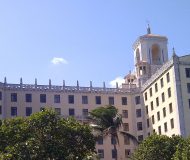Cuban Housing Market
Cuba has long been known as one of the world’s most desirable destinations and before the communist revolution in 1959, foreign investment into Cuban property and commerce was significant.
In 2014, the Cuban government passed the Foreign Investment Act, which once again allows international investment into many sectors of the island’s economy. Of particular importance, the Act permits foreign investors to purchase ownership and other rights over real estate in Cuba, as long as investments are made as a joint venture or via a registered company.
Foreigners can therefore invest in real estate for private or tourist related purposes in Cuba, whether residential or commercial, and the relaxation of foreign ownership laws has already prompted a significant rise in foreign investment island-wide, which in turn is pushing up the value of Cuban properties.
Purchase Process
The purchase process for properties in Cuba has also been simplified and prices can therefore be set freely and negotiated between the seller and the buyer. Properly transactions must be registered at the National Registrar Properties Office within 30 days of signing a sales and purchase agreement.
Real estate transactions can be legally executed in the presence of a registered Notary with sales tax is set at 4% of the agreed sale price, paid by both parties. Transactions take place though a local bank in Cuban Pesos, where the buyer can make a deposit and issue a bank cheque in the name of the seller (it is common practice for both parties to use Cuban Convertible Pesos in real estate deals, even when the sales contract states the purchase is made only Cuban Pesos).
Ownership Options
For a short period in the 1990s, the Cuban government permitted the construction of condominiums where foreigners could buy an apartment in their own name. Those who did are still permitted to sell their properties to other foreigners, but this is the only instance in which a non-Cuban can legally invest in the real estate market without a local partner.
Many foreign property purchases in Cuba currently involve permanent or temporary residents, either foreigners married to Cuban citizens or those with shares in a company or corporation that is registered with the Cuban Chamber of Commerce. The latter is considered the most secure form of investment and it is possible for foreigners to invest in an existing Cuban enterprise in order to buy property.
Obviously, in a state-run economy that is only just beginning to relax its rules and regulations for private investors, professional advice and assistance is not only advisable, but essential. Palm Group has the knowledge, experience and contacts on the ground to make sure that your Cuban real estate purchases are secure and profitable.






